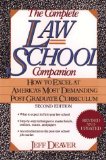The Complete Law School Companion, by Jeff Deaver
Book review by Erin Lindsay Calkins. Published July 2008, last updated March 2011.
The Complete Law School Companion, by Jeff Deaver
 My pre-1L summer is a lean time: anticipating large school loans and living on a student budget, I am wary of spending cash on things that are not obviously worth my while. Law school how-to books are no exception. In order for one of the lot to be worth its salt, it must 1.) tell me something that I have not already heard from my peers who are in or have already gone through law school and 2.) consolidate helpful recommendations into a short list that I can consult quickly and easily.
My pre-1L summer is a lean time: anticipating large school loans and living on a student budget, I am wary of spending cash on things that are not obviously worth my while. Law school how-to books are no exception. In order for one of the lot to be worth its salt, it must 1.) tell me something that I have not already heard from my peers who are in or have already gone through law school and 2.) consolidate helpful recommendations into a short list that I can consult quickly and easily.
Judging from my survey of these manuals over the past couple of months, this test proves difficult to pass. Jeff Deaver’s The Complete Law School Companion solidly satisfies the two requirements, although there are large sections in the book that may be skipped.
The book opens with two perfectly ignorable sections, one about evaluating whether or not you should go to law school, and the second regarding preparation for the LSAT. The former question is beyond and beside the stated purpose of the book. Enough said. As for the LSAT, buy an updated prep book and take a class. Reading the examples here, from 1992, is not going to help you. Similarly, the description of the Socratic method is likely to be old hat to many aspiring law students. Finally, Deaver devotes two sections in the opening chapters to discussions of various types of law (e.g. public interest, corporate law, government practice, etc). This section may be thought provoking and potentially instructive to students who do not have much real-world experience or whose experience is limited.
Deaver’s primary—and most useful—strategy is his “Legal Concept Management” (“LCM”) method for organizing information learned in classes in law school. LCM involves keeping separate notebooks for case briefings, class notes, and outside reading; outlining each of these notebooks separately during the semester; and integrating all three sources into a master outline, complete with an index and page numbers, prior to the examination. I found the strategy straightforward and potentially useful, though difficult to envision without actually being in classes, taking notes, and completing homework assignments. The techniques may yet come in handy in the fall. On the other hand, the most helpful aspect of LCM may be in its ability to reassure the reader that the information that she learns during her 1L year will, in fact, be manageable – undoubtedly she has been told otherwise.
In the same vein, the author provides a sample format for examination answers that he suggests you memorize in order to be able to efficiently churn out your information during the exam period:
I. [Short Anser]
II. Issues Presented
III. Analysis
Issue I
[Rule of Law]
[Applicable facts]
[Conclusion]Issue 2
[Rule of Law]
[Applicable facts]
[Conclusion][Remaining issues the same way]
IV. Other considerations
V. Conclusion
(Deaver p. 132.)
As with LCM, I imagine that it would be most helpful to tweak the template to suit your own style; the helpful nugget here is the suggestion to memorize an answer template, regardless of exact format.
Aside from the answer format and LCM method, Deaver offers several stand-alone tips:
- Learn to speed-read. Deaver insists that it saves buckets of time while maintaining a consistent level of comprehension and retention. Having tried this technique and found it more time-consuming than productive, I do not plan to follow this advice. Depending on your temperament and willingness to practice, it may be worthwhile.
- If you intend to brief cases, do so within a day or two of the class, so that the facts remain clear in your mind for potential Socratic grilling.
- Don’t cut class.
- If you intend to buy commercial briefs or commercial outlines, do not buy them at the expense of writing your own briefs and outlines. Doing so will compromise your ability to comprehend and retain.
- Be wary of false confidence in open-book exams; allotted time is extremely short.
In short: should you buy this book? Yes, if you can find it on the cheap, and if you are willing to skip some chapters to avoid getting bogged down. There is some quality advice here, but—as the wisdom goes about 1L courses themselves—be careful not to lose the forest for the trees.
Read more reviews on Amazon: The Complete Law School Companion, by Jeff Deaver
One L, by Scott Turow
Planet Law School II, by Atticus Falcon
The Law School Breakthrough, by Christopher J. Yianilos
The Complete Law School Companion, by Jeff Deaver
How to Succeed in Law School, by Gary A. Munneke
How to Get into the Top Law Schools, by Richard Montauk
Sabatini Law School Exam Guides Complete Review
